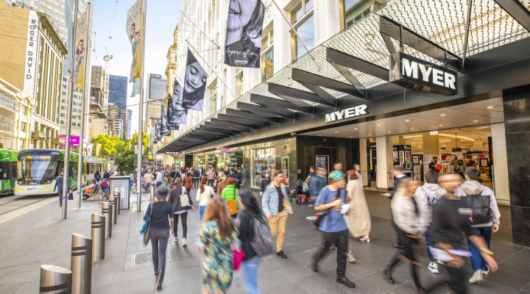 Last week’s worse-than-expected retail turnover figures have sparked concerns that the crucial holiday trading period may deliver lacklustre results for retailers, particularly bricks-and-mortar traders.
Last week’s worse-than-expected retail turnover figures have sparked concerns that the crucial holiday trading period may deliver lacklustre results for retailers, particularly bricks-and-mortar traders.
Retail spending fell 0.6 per cent in August on a seasonally adjusted basis according to ABS data, the worst month-on-month decline since 2013 and twice as low as economists were expecting.
Now industry analysts at IBISWorld are anticipating subdued growth over December to cap off a weak 1.9 per cent annualised growth figure for the retail sector in 2017, on expectations that the holiday season won’t loosen purse strings as well as it usually does.
“When it comes to Christmas, people are usually willing to spend even though they are uncomfortable with their finances, [but] we’re starting to see that consumers are getting pushed in terms of how much they can actually spend,” IBISWorld senior industry analyst Nathan Cloutman said.
Increasing power prices, high healthcare costs and rising rental prices are weighing on household budgets moving into December, while global political uncertainty is also putting downward pressure on sentiment, which on the latest Westpac Melbourne Institute index for September is below neutral at 97.9.
Cloutman also says online shopping, which is flagged to grow by an annualised 9.4 per cent in 2017, will put even more pressure on margins this year than last as the relevance of e-commerce as a more convenient and cheaper option for time-poor Christmas shoppers becomes more pronounced.
It’s bad news for high street, particularly given that IBISWorld reckons the November to December period has pushed revenue up by 23 per cent industry wide over the last five years – a figure that’s on the decline.
“Consumers have more opportunities to shop online and hunt for the best deals, which you wouldn’t have had a decade ago,” Cloutman said.
Retailers aren’t feeling all too flush about the holidays either. Dun & Bradstreet’s recent Business Expectations Survey found that retailer optimism about the upcoming December quarter is down 42 per cent on last year and 67 per cent on two-years ago.
The survey of 1,200 industry executives throughout Australia identified retail as the least optimistic industry in the country and also one of the sectors that plans on hiring the least amount of additional employees over the next twelve months.
But there may be some recompense for the sector’s holiday hopes, with the rise of other spending holidays grounding a fast-moving change in the significance of the twelfth month of the year.
Pointing to the growth of America’s Black Friday and Cyber Monday holiday in the UK in recent years, as well as the sharp uptick in activity over the last weekend of November in Australia last year, Cloutman believes that what was once a two-week peak is quickly turning into a two-month affair.
“[Black Friday and Cyber Monday] are becoming a lot bigger, before the holidays were just a few weeks, but now it’s increasingly November, December and January,” Cloutman said.
“There’s other ways to drive sales by taking advantage of these spending holidays.”





